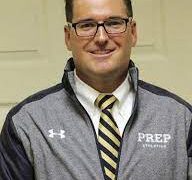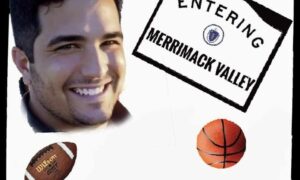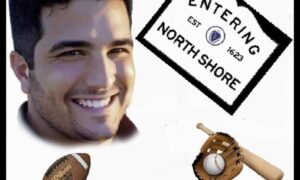BEVERLY – The applause was deafening.
The wait—what felt like an eternity.
The moment? Forever etched into Endicott history.
Nearly three years to the day after a devastating stroke sidelined him at just 22, Jack Smiley ’25 (Washington Crossing, Pa.) made his triumphant return to the ice on Senior Day (Feb. 15). As the men’s ice hockey team faced off against Johnson & Wales, their captain stepped back into the rink—not just as a player but as a symbol of resilience, perseverance, and the unbreakable spirit of the game.
As seniors were honored on the ice, Smiley skated out and into the arms of Endicott Head Coach R.J. Tolan and his beaming parents against the roar of the crowd. Smiley then took a minutelong shift, taking advantage of every second, buzzing around the ice, winning a few puck battles, and creating a scoring chance for the Gulls.
In the days before the game, Smiley said he was focused on living in the moment, taking every single day as it comes while trying to be better for tomorrow.
“That’s one of the biggest things I attribute to my progress and the success of my recovery so far,” he said. “But now that it’s so close, it’s hard to keep my emotions at bay, and I can’t even describe what it feels like to play.”
“There aren’t enough words to express the love, pride, admiration, and excitement I feel for everyone in our Endicott family to have Jack celebrated with his teammates,” said Tolan. “To witness his perseverance firsthand has made us all in awe of Jack. He has shown us the meaning of winning and is truly amazing.”
Smiley’s journey began on February 21, 2022.
During a routine practice with the Endicott men’s ice hockey team at Raymond J. Bourque Arena, he felt a strange sensation in his arm. Then, in an instant, his words disappeared.
“I remember clear as day what everything felt like, what I was saying, where I was saying it,” Smiley recalled to CBS Boston in 2023.
Tests revealed a small fracture near Smiley’s left vertebral artery, caused by a hit to the back of his neck during practice. The injury led to a blood clot in his brain stem, leaving him paralyzed on his right side. Inside the Neurological Intensive Care Unit at Massachusetts General Hospital, doctors couldn’t say if he would ever walk again.
“No one’s prepared for the events after a stroke, and for me, being a 22-year-old NCAA athlete, I didn’t even know what a stroke was,” Smiley recalled. “Even when I was having it and going through that experience, and even the couple days after, I hadn’t processed any of it, and I just remember thinking, ‘Oh, I’m indestructible.’ I’m a 22-year-old kid. I bounce off the ground and I’ll be fine in a couple of days.”
But the brain is a mystery, even to doctors, who couldn’t predict Smiley’s trajectory. Still, Smiley had a lot working in his favor. He was young. He was athletic. He treated his body well to support his athleticism. Doctors gave him reassurance and encouragement to have hope.
True to his nickname, “Smiles,” Smiley maintained a positive outlook, even when relearning skills from childhood, including how to eat, speak, and get out of bed again.
“I didn’t feel scared,” he said in a patient recovery story for Spaulding Rehabilitation Hospital. “I’m someone who takes each situation and moment as they are.”
David Lin, MD, who works in Neurotechnology and Neurorecovery at Mass General Hospital and studies how the brain rewires to support recovery from stroke, said Smiley’s “remarkable recovery” started the moment he came to the neurological intensive care unit.
“His recovery is a testament to what’s possible with his resilience and the support of an interdisciplinary team of neurologists, physiatrists, therapists, family, and friends,” he continued. “As scientists and clinicians, we learn from each of our patients, and Jack has taught us so much about what is possible.”
Smiles through the struggle
After his hospital stay, Smiley embarked on a grueling three-month recovery—one he chronicled step by step on social media, turning his fight for healing into a testament of resilience and determination.
“I already used my social media as a creative outlet before the stroke and had built a following,” Smiley told Endicott’s Soundings magazine in December 2024. “I used it as an escape when I was in the hospital and couldn’t even get out of bed on my own. It was like my therapy, and then I realized it was helping other people going through adversity, too.”
“Through every day of intensive rehabilitation, Jack pushed himself to achieve the highest level of recovery possible,” said Cara Brickley, PT, DPT, MRMC, Vice President of Operations and Director of Inpatient Rehabilitation at Spaulding Rehabilitation Hospital. “All of us take enormous pride in the progress he continues to make and that he now serves as a powerful advocate to educate the public on the signs of stroke.”
After rehab, the exercise science major returned to Pennsylvania and designed his physical therapy regimen, which included yoga, learning dance from a Philadelphia Eagles cheerleader, and training with an MMA fighter. Since returning to campus, he has continued training with the team while pursuing internships, including with his hometown team, the Philadelphia Flyers.
In the summer of 2023, he worked as a strength and conditioning intern at the Flyers’ Skate Zone facility in New Jersey, gaining firsthand insight into the behind-the-scenes work of professional sports performance. Alongside women’s ice hockey student-athlete Payton Hansen ’25, Smiley helped design workout programs for players, working closely with the team’s strength coaches.
The experience opened his eyes to the meticulous preparation required at the professional level, from adjusting training regimens based on injuries to refining exercises for peak performance. Drawing from his exercise science coursework, Smiley saw how theoretical knowledge translates into real-world application.
Beyond the technical skills, he was struck by the Flyers’ tight-knit culture and brought elements of that camaraderie and practical lessons from the weight room back to the team at Endicott.
With his comeback cemented, Smiley is now looking ahead to graduation—a milestone delayed because of his recovery. He’s still considering a master’s in sport science at Endicott, but wherever his plans lead him, he wants to continue advocating for stroke awareness.
“My friends, my family, everyone I’ve worked with, they’re why I’m here,” said Smiley. “They’re the reason I am who I am. And everyone here at Endicott—especially my teammates and Coach Tolan—is what motivated me to get back. They’re my rock.






